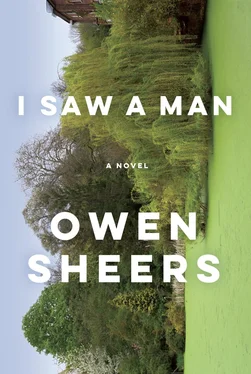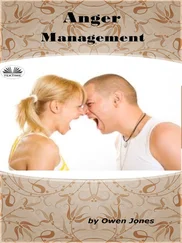Martha drove her, straight to the police station to be with Josh. A policewoman had already visited the parents of Rachel’s friend and explained. Yes, the friend’s mother had said, holding her hand to her mouth and nodding, pale. Yes, of course Rachel could stay for the night.
Samantha and Josh returned home in a taxi, holding each other as they walked the short path to their front door. By the time Michael had seen Josh in the garden they’d already been back for more than an hour. Samantha had gone straight to bed, where she’d cried herself to sleep. But Josh hadn’t been able to sleep so had paced the house instead, trying to understand. He’d opened a bottle of wine and drunk two glasses in quick succession, then he’d gone out into the garden, where, unaware of Michael watching him from above, he’d wept before the dark waters of the pond, hitting his hand again and again against the fence as he slid to his knees, succumbing to his tears.
―
Michael couldn’t sleep that night, either. He’d come back from the Heath intending to tell Samantha and Josh everything. But the sight of Josh crying had flushed all resolve from his body. He’d remained by the window for as long as Josh had stayed by the fence, and had only moved away once he’d seen him get up and walk back towards the house.
Going to his bathroom, Michael had undressed and showered, standing with his head under the beating water until the tank ran cold. As he’d watched the dirt wash from his knees and swill down the plughole he’d thought, briefly, about killing himself. It was too overwhelming. The vision of Caroline, Lucy’s falling, Josh’s weeping. He wanted to leave it, escape. But then somewhere deeper, below thought, he’d recognised this impulse as chemical, a passing reaction he must let work through its process. Which it did, the urge subsiding as Michael dried himself then went into his bedroom to try and work out what it was he should do next.
Of one thing he was now certain. He could not confess. He could not tell Samantha and Josh he’d been inside their house. As he’d lain on his bed through the rest of the night, his eyes open in the dark, this is what Michael repeatedly told himself. That now, having set his course in those seconds on the landing, and then in his leaving, there was nothing to be gained from further accumulation of anger or grief. Lucy was gone. He had seen her die. But he had not killed her. He had witnessed, but he had not committed. Telling her parents would not bring her back to life. It would only, most likely, take him away from theirs, exactly when he might be of most help to them, as a friend and a neighbour.
Michael knew this logic seemed perverted and was also dependent upon him not being caught, on a trace of his presence not being found in the house. And even if he did escape suspicion, he was so disoriented he didn’t know if he’d be able to justify his thinking in another hour’s time, let alone the next morning. But he did know, in a bald sense, that it was true. He had to be practical, to think, now that it had happened, now that Lucy was dead, how the most good might be done.
As he lay on his bed, the dawn light rising up the wall beside him, Michael endlessly turned over combinations of reasoning until he’d convinced himself that this was the only way forward. That from now on all his effort, all his actions, should be directed towards healing, not blame. It was an argument, he decided, as the sun edged higher and the first swimmers arrived in the ponds beyond his window, to which he could hold only if it overwhelmingly became his defining purpose. And yes, his atonement, too, his penance. To carry the knowledge of Lucy’s death alone, while doing all he could to help her parents recover from their grief, just as they’d helped him recover from his.
As Michael made these promises to himself he became painfully aware of the presence of the Nelsons’ home, just the other side of his wall. Its weight seemed improbable and yet painfully tangible. All through the rest of that day, as he forced himself to get out of bed, to dress, eat, he could feel it pressing against his own small rooms. And the thought of Lucy, dead, pressed upon him too. It seemed unthinkable that her vitality could be stilled in such an instant. That all she was, all she had been — all her memories, the imagined lives of her dolls, her favourite toys and colours — had become, the moment she’d hit those stairs, no more than Oliver’s description of a spongy organ, heavy with death inside her skull.
But most terrible of all was the fact that he’d been responsible for that reduction, that grotesque transition from body to corpse. This, beyond his grief, was the cutting edge of her death for Michael, the sickening knowledge he’d carry for the rest of his life. That it was he who’d caused Lucy to fall. He who had killed her.
Although for the rest of the day he kept to his flat, Michael was unable to stop himself constantly checking the windows. But however many times he looked he saw no more of Josh in the garden, and nothing of Samantha either. He kept his phone in his pocket. He listened for sounds from their house, but heard nothing. And yet he knew they were there, just next door, the two of them, scoured by the loss he’d caused, woken like childless newlyweds into their altered lives.
Around mid-morning, as he was filling the kettle at his sink, Michael saw a car pull up in the street. A woman got out, went round to the passenger seat, and opened the door. Rachel, a blue rucksack over her shoulders, stepped onto the pavement. Taking her by the hand the woman, who was short and tanned with a neat grey bob, walked her down the path to her front door. Minutes later the woman reappeared, got back in her car, and left.
Michael wanted to speak to them. He thought about calling, or sending a text. But he could not until he, himself, had somehow been told. These were the rules he’d set himself. Having deleted his minutes in their home, he must now act and react as if his truth was the only truth. As if he’d walked across the Heath to his lesson, and then he’d come back. He had slept and now it was Sunday. A quiet day, a high bank of clouds pressing a humid heat upon the city. A day when families stayed close, until later in the evening, which is when, often, Sam or Josh would call him and ask him to join them for dinner.
He couldn’t work, and he didn’t want to leave the flat, but he had to do something. So he sat at his desk in the study making the movements of work instead: arranging notes, printing out the last chapter he’d written. In it, Michael had described his first meeting with Oliver Blackwood, but had done so while removing himself from the scene. Having filleted their conversation, recalled his observations — Oliver’s silver Mercedes SLK, the brightness of his tie — he’d recounted the action in third person as if he, himself, had not been there.
The occasion had been a friend’s funeral, a novelist who’d died of a sudden brain haemorrhage. Oliver was the surgeon who’d operated on him. He’d failed to save him, but, as he’d told Michael in their first conversation at the wake, when he’d learnt of his patient’s profession a few days later, he hadn’t regretted his failure. “He’d have had no language,” Oliver had said with a doctor’s frankness. “No linguistic facility to speak of at all. A man of words, of letters, of meaning, robbed of all that.” Reaching across Michael he’d picked a canapé from a passing tray, a roll of salmon bedded on a slice of bread. “No,” he’d said, taking a bite from it. “Better like this in many ways. Sometimes it just is.”
Although in the chapter before him Michael had removed his response to Oliver that day, now, sitting at his desk with the weight of the Nelsons’ home beside him, he found himself repeating it from across the years. “Yes,” he heard himself say, as if somehow the vocalised word might strengthen his resolve. “Sometimes it is.”
Читать дальше











